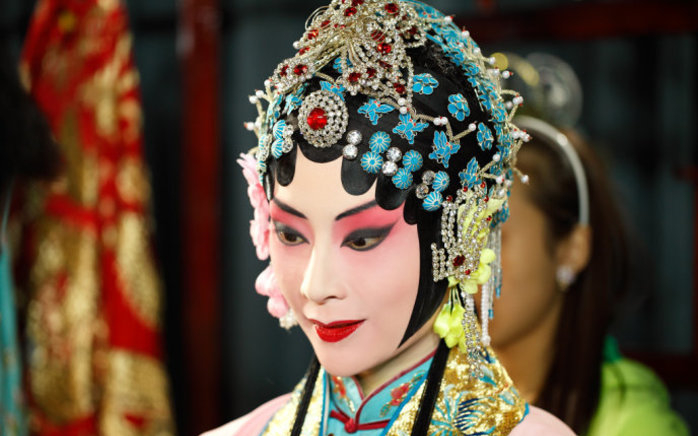By Tom McGregor, CNTV Panview Commentator and Editor
China’s traditional culture is playing a more prominent role in the nation’s contemporary era. Chinese President Xi Jinping has highlighted the significance of the country’s ancient roots for adapting to our current world.
Chinese culture stands unique compared to the arts and customs of other countries. Peking Opera has stage performers who sing, dance and do acrobats, while wearing intricately designed and colorful costumes.

The singing style is not something you would hear at an Italian Opera House or elsewhere around the globe. It sounds raspy and high-pitched that is accompanied by Chinese instruments, which creates a crescendo of loud sounds.
The costumes are dazzling, while performers conduct amazing acrobatics to accompany the plays that often have narratives filled with action-packed adventures, such as battles, sword-play and one-on-one combat.
But for foreigners going to the theater without an English translation could mean the plays are nothing more than noise.
Grand translation project
More needs to be done to translate the great works of Peking Opera into English.
Sun Ping, a Peking Opera master, has launched an initiative to translate 100 opera classics in ten volumes in the English language. At a press conference in Beijing last week, she announced the first two volumes have already been released to the public with more to follow soon.
Each volume is compiled with ten classics translations. A 40-person team composed of experts, academics and professional translators work with Sun, editor-in-chief, who is in charge.
The project was launched by Sun in 2011 and promises to provide readers not only with translations, but would be a bilingual guide with a preamble, music scores and photos.
China’s Vice Premier Liu Yandong has offered strong government support for the project.
Fulfilling a need
Sun feels called on a mission to translate the classics. She fears that if the task is ignored, global audiences cannot fully appreciate the art form.
She was inspired to move forward on the project when she visited Yale University in 1999. As a master of Peking Opera, she was invited to speak to students. They asked her for English translations of the classics.
She went to the campus library and discovered there were no translations published in book format. After returning to Beijing, she assigned Remnin University, Beijing Foreign Studies University and the University of Hawaii to collaborate on the project.
After publication, the volumes will be delivered to China’s embassies and consulates overseas, Confucius Institutes, foreign universities and US Presidential libraries. Readers can find them for purchase at book stores as well.
An emotional attachment
Sun has been a lifelong devotee of Peking Opera. She captured fame on stage as a performer and after retiring from the theater, she made it her calling to promote the art all over the world.
“My feeling is complicated to see the books of series published one by one,” she told China.org.
“I’m happy, but I feel it’s a little too late. China doesn’t lack culture, art and masters, but the world has not yet seen them and looked at them clearly and deeply with understanding and knowledge,” said Sun. “We need to hurry up.”
Zhou Yude, former president of the National Academy of Chinese Theater Arts, holds similar sentiments.
It’s now or never to translate the classics, while some Peking Opera masters are still alive.
People are becoming more curious about China and the classics can explain Chinese culture to the masses.
Teaching tales
Peking Opera and Kunqu Opera have already been listed as an intangible cultural heritage by UNESCO (United Nations Educational, Scientific and Cultural Organization).
The Peking Opera offers a glimpse into an understanding on some of the mysteries of Chinese society. With English translations of the classics, readers can catch a special view of ancient China and see how it connects with its current age.
( The opinions expressed here do not necessarily reflect the opinions of Panview or CCTV.com. )

Panview offers a new window of understanding the world as well as China through the views, opinions, and analysis of experts. We also welcome outside submissions, so feel free to send in your own editorials to "globalopinion@vip.cntv.cn" for consideration.















